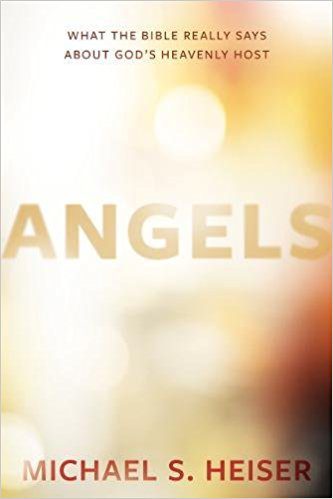Our next port of call is Ps. 104.4, where we hear of ‘ruah’ in the plural (‘spirits’– probably not to be translated winds here) and also ‘malakim’– messengers, plural. The later speaks more to a major function of these beings, the former to their very nature. Here these angels are also called God’s ministers. Ps. 103 is rightly compared to Ps. 104 on these scores (pp. 5-7).
While the word ‘samayim’, which occurs over 400 times in the OT regularly refers to the sky in the OT, the ‘heavens’ visible from earth, there are places where it refers to heavenly beings. For example, Ps. 89.5-7 refers to the divine council of the holy ones as well as exhorting them as the heavenly ones to praise God’s wonders. Praising God is one of the main roles of the heavenly beings (see e.g. Rev. 4). Job 15.15 is rightly pointed to by Heiser as another place where samayim means heavenly hosts, not the heavens in general. But the best example is Deut. 32.43 where the term elohim is found in parallel with samayim. Not incidentally, I agree with Heiser that we need to stop translating elohim as gods when it is not being applied to Yahweh himself, as that simply confuses the issues. Spiritual beings would be better. I agree with Heiser that various readings of the OT have muddied the waters by trying to find an evolutionary spiral from polytheism to henotheism (Yahweh is the ‘most high God’) to monotheism in the OT. I think Heiser is right to warn against this sort of reading of the OT. In fact it is more monotheistic early, middle, and late than some scholars realize, and care has to be taken in how one renders elohim. For example, in Psalm 8 we humans are said to be a little less than the elohim, and this probably means angels— spirit beings here. It probably doesn’t mean gods or the God.
Another of the more fascinating terms applied to angels in the OT is the ‘star’ language. For example in Job 38.5-7 we have another example of Hebrew poetic parallelism where we hear of the morning stars singing together followed by a line about the sons of God (the highest category of angels?) shouting for joy. Of course, this raises questions because we know at least some of the ancients thought the stars in our sky were living beings, were actually the heavenly hosts. For example, when we hear in Mt.2 about the Magi being led by a ‘star’ that simply parks itself over the manger where Jesus lies in Bethlehem, it’s reasonable to conclude this is a reference to an angel, not an actual comet, or wandering planet etc. But this raises a further question. It’s one thing to call actual angels ‘stars’ its another to believe stars are actually angels. It would be difficult for modern persons aware of the real nature of such celestial objects to agree with the notion that they are living beings, when in fact not only are they NOT living beings, they don’t appear to even have any beings living on them so far as we can tell thus far.
Angels are also called ‘holy ones’ in part due to their proximity to the Holy One, but it also refers to their character. But that character can be tainted or marred, just as is true with human beings. In his discussion of ‘elohim’ Michael is right that in a text like Ps. 82.1-6 the reference is not to human beings being the sons of God in question. He is also right to stress that elohim here must have a plural meaning. The term means divine beings, not gods here. I quote Heiser p. 11 “Many scholars use these passages to argue that biblical writers at one point in Israelite history were polytheists. This thinking is misguided and rooted in the mistaken notion of what the world ‘elohim’ means. We tend to presume that the biblical writers thought about elohim in the same way we think about capitalized G-O-D. When we see the word ‘God’ we instinctively assign a unique set of attributes (e.g. omnipresence, omnipotence, sovereighty) to the letters G-O-D. But this presumption is incorrect and leads our thinking astray when we encounter instances where elohim is intended to describe a group of beings instead of the lone God of the Bible.” As he goes on to show, while elohim is used thousands of times of Yahweh in the OT it can also be used of deceased human beings (1 Sam. 28.13) territorial spirits (‘demons’?– Deut. 32.17), gods of the surrounding nations (Judg. 11.24; 1 Kngs. 11.33), and of spiritual beings in general judged by Yahweh (Ps. 82.1-6). Elohim in texts where the grammar requires a plural meaning does not refer to what we mean by the word God. It means other spiritual beings. For example, in Qumran Heiser points to 180 cases where elohim refer to the heavenly host in the divine council (p. 13).
In his discussion of ranks and status of angels, one of the clearest signs of hierarchy is the use of the term prince (sar) or princes which refers to ‘the sons of God’ in Deut. 32.8-9, who are assigned the task of overseeing and judging the nations. The use of the term prince is one of the clues that the Hebrew writer is adopting and adapting the language of the divine council used in the ANE. We learn further that angels are worshippers, advisees in the divine council, watchers of earthly events, guardians and judges of nations as well as messengers. They are not just God’s FedEx boys. Indeed, there is even evidence of a celestial army of angels fighting for God’s causes. In our next post we need to address who and what is the ‘malak Yahweh’ the so-called angel of the Lord.













